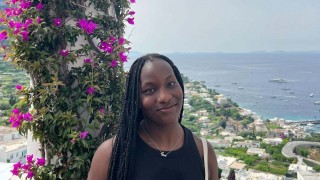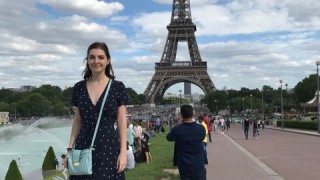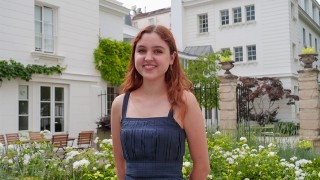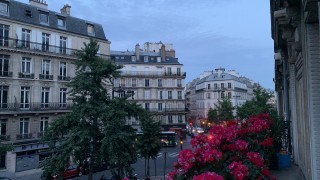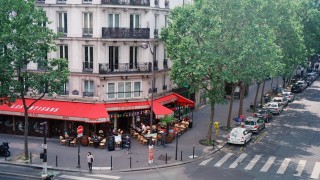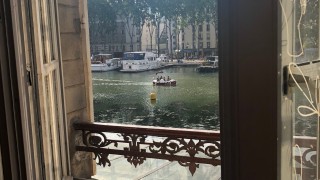The program invites you to explore all that the city of Paris has to offer during a five-week program based at Columbia's Reid Hall in Paris. Choose from the French Immersion track or English track. On this program you will explore both contemporary and historical issues in French and Francophone culture, and go outside of the typical tourist experience to gain an insider’s view of the city.
Program Overview
On this program students will learn about the layered history, culture, and society of France and the Francophone world. The academic curriculum is suitable for many different majors and students do not need to have French language background to apply.
The courses offerings will provide students with opportunities to deepen their appreciation of Parisian culture, improve French language skills, and learn more about French/Francophone culture. Students will take six points: two courses OR the accelerated French language course.
Classes are typically Monday to Thursday, while on Fridays activities are planned in conjunction with the courses to offer more cultural exposure to the city.
Eligibility and Application
- Currently enrolled undergraduate students in good academic and disciplinary standing
- Graduate students and post-graduates are all eligible to apply
- Minimum 3.0 average language GPA (if applicable)
- Minimum 3.0 cumulative GPA
- Students must meet prerequisites for individual courses
How to apply
Want to apply? Click the “Start Your Application" button at the top of this page. If the button doesn't appear, the program is not yet accepting applications. You will be asked to set up a short profile, which will allow us to send you relevant information about your application. Once you’ve created a profile, you will see a checklist of items that you will need to submit. These generally include:
- Application questionnaire(s)
- Personal statement
- Letter of Recommendation
- If you are applying to the French track, your recommender typically be your most recent French instructor.
Academics
Participants choose their courses according to personal aspirations and interests as well as the course schedule. Please note that the course offerings and schedule are still subject to change. Attendance at all class meetings, concerts, and excursions, unless otherwise indicated, is mandatory.
Note: The University reserves the right to withdraw or modify the courses of instruction or to change the instructors as may become necessary.
SUMMER 2024 COURSES
The French and Francophone culture courses are all designed to deepen your engagement with the paradoxes, pleasures, and contradictions of Paris, France, and France's relationship with its former colonies. These courses will challenge you to look at the history and culture of France from various perspective while using the city as an essential resource throughout the program. You may select courses from either the French Immersion Track OR the English Track--students may not "mix and match" courses from both tracks.
FRENCH IMMERSION TRACK
Race, Class, Gender, and Sexual Orientation in Twenty-First Century French and Francophone Literature and Film. 3 points.
Instructor: Laurence Marie, Lecturer in French, Columbia University
Taught in French.
In this course, students will explore the representations of inequality and identity in French and Francophone literature and film released in the last decade. Drawing from the specificities of French history and culture, they will analyze structures of oppression and forms of agency depicted in the stories of individuals confronted by discrimination. Students will have the opportunity to meet several of the authors studied. Writers include David Diop, Abdellah Taïa, Kaoutar Harchi, Djaïli Amadou Amal, Edouard Louis, Constance Debré, Camille Laurens, and Virginie Despentes.Film directors include Alice Diop, Ladj Ly, Céline Sciamma, Houda Benyamina, and Sébastien Lifshitz.
La Belle Epoque in Paris (COI pending) 3 points.
Instructor: Laurie Postlewate, Senior Lecturer in French, Barnard
Taught in French.
The city of Paris in the years 1870-1914 was the scene for one of the most vibrant, progressive and chaotic periods in the history of France known as “La Belle Époque.” Bookended by the revolution of the Paris Commune and the outbreak of World War II in 1914, this era saw simultaneous and successive waves of social and cultural disruption, discovery and innovation at all levels of society, in all dimensions of economic and political life and in all areas of artistic creation. We will experience this extraordinary period using a number of iconic sites in and around Paris as the catalyst for exploring the political events, artistic movements and cultural phenomena that were happening at the time. These will include the advent of the Third Republic, the industrial boom, and the Dreyfus Affair; the avant-garde in art seen through Impressionism, Fauvism, Cubism, in music with the compositions of Debussy, Satie and Saint-Saëns, in the theater with plays of Sardou and Rostand and in literature with the writing of Zola, Huysmans, Mallarmé, Rachilde, René Vivien, the early Colette, Proust and others. Throughout our exploration we will consider not only the beauty and sparkle of the era, but also the darker underside of this moment of intense social and cultural tension. And finally, we will consider that the term “La Belle Époque” is itself a label and a retrospective lens through which the mid-twentieth century saw the period of 1870-1914. This will lead us to examine how collective memory is a cultural process that creates “periods” in the past to better explain the present. Class activities will include site and museum visits, concerts, theater and promenades in the city of Paris and its environs.
ENGLISH TRACK
Cinema of the Arab World.
Instructor: Richard Peña
Taught in English.
This course counts as a Global Core at Columbia.
An overview of the major developments in the art and industry of cinema in the
Arab World, ranging from its earliest days to the most recent works of the digital era. Especially
since the Sixties, Arab filmmakers have developed dynamic national cinemas that have sought to
tell their own stories in their own ways—even when those accounts often reveal problems and
contradictions in their societies. The interaction of Arab filmmakers with international
movements such as neorealism, modernism, cinema vérité, and postmodernism also will be
addressed. Among the filmmakers to be studied are Youssef Chahine, Elia Suleiman,
Mohammed Malas and Tamer El-Said.
MENA4100OC: Migration, Displacement and Diaspora in the Contemporary Mediterranean. 3 points
Instructor: Madeleine Dobie, Professor of French and Comparative Literature, Columbia University
Taught in English.
This course counts as a Global Core at Columbia.
This course examines the social, political and cultural history of migration in the Mediterranean, with a particular focus on France and Africa. We examine the forces that have underpinned migration in the nations of the Mediterranean rim since the 1950s and observe major transitions in policy and legal frameworks. Though migration is often treated in mainstream media as an object of policy and legislation, it is better approached as a ‘total social fact’ involving political, social, economic and cultural dimensions. With this in mind, we look at different media, genres and narrative forms in which migration has been represented and debated and grapple with questions about the relationship between lived experience and representation and between politics and the arts.
The Olympics and the Politics of International Sport. 3 points.
INSTRUCTOR: Evan Brown, PhD candidate in History, Columbia University
Taught in English.
Paris will host the 2024 Summer Olympics, marking the third time the city has held the global sporting festival. This puts us in the perfect place to tackle lively questions about the history and present of sport around the world. Why did sport come to occupy such a prominent position in international culture and politics? What part did sporting practices play in the histories of empire and decolonization? How does sport continue to express social conflicts and shape understandings of class, race, gender, and nation? And what about the athletes, fans, sponsors, governments, and international organizations that keep the industry in motion? From the ideological roots of the Olympic movement among French elites to the burden of hosting as it bears down on the margins of Paris today, we will examine the local and global implications of sport as a cultural practice, political contest, and economic concern.
France and the African Diaspora. 3 points.
Taught in English.
This course counts as a Global Core at Columbia.
This course explores France’s complex racialized colonial history by encouraging students to examine the ways the country helped constitute a racialized colonial empire and the ways it created the conditions the conditions to challenge it. The course encourages students to contemplate how France has figured into the creation of the African Diaspora and how diasporic movements for freedom have shaped France. The course will build upon the concept of vernacular landscapes to encourage students to examine how these histories are memorialized, or not, in France today. Topics to be explored will include: the impact of slavery on France, including its port cities including Nantes; the intertwined character of the French and Haitian Revolutions; the convergence of anti-colonial movements in Paris during the interwar period and beyond, and the experiences of Black expatriates in the country during the twentieth century. The course’s location at Reid Hall in Paris will give students ample opportunities to students to examine the reciprocal impact between France and decolonization and freedom movements.
Academic Schedule
When selecting your courses, please make sure that the courses you choose are not in conflict with each other. In general, the program tries to avoid conflicts with courses.
Grades and Transcripts
Grading Policy
Click here for the Columbia summer program grading policies.
Transcripts
Upon successful completion of the program, grades are entered into Columbia's online grading system.
No credit is granted to students who do not complete the full program.
All courses taken on the program are converted to an American grading scale and transmitted to students as follows:
Columbia students: Grades appear on SSOL and your transcript as semester grades from courses taken at Columbia. For more information, please see the section on Academic Credit in Steps to Study Abroad.
Barnard students: Grades appear on eBear and your transcript as any semester grades from courses taken at Barnard. For more information, please see the section on Credit and Transcripts for Barnard Students on our Barnard student pages.
Non-Columbia students: can request electronic transcripts online through the Columbia University registrar.
Life in Paris
Housing
Program Housing
Residence Hall: Students will live in a single furnished rooms with access to a private bathroom, shared kitchenette and laundry facilities, or in furnished studio-style apartments with their own kitchenette.
Homestay: Live with a francophone family and live like a true Parisian, off the beaten tourist path. Homestays are located throughout Paris and the nearby suburbs and never more than a short train ride from Reid Hall. You will have your own room and share common spaces with your host family and will share meals with them. Sharing meals in France is not only an excellent opportunity to practice your language skills but the chance to partake in an essential part of French culture. Living with a host family is a great way to experience firsthand the daily rhythm of French life, learn about Paris from an insider's perspective, and be immersed in a French-speaking environment. The following meals are included in this option: breakfast, and three dinners a week.
Daily Living and Schedule
Depending on the specific courses you take, you will have different commitments for work outside of class. Your commute to Reid Hall will also be between 35-50 minutes, on average. Weekends are free and students are encouraged to enjoy Paris on the weekends.
The program has many course-related activities, as well as a few social events, that will help students engage with the cultural life of Paris. Past activities have included theater workshops, pottery, crépe-making, wine tasting, and excursions around Paris. You will have adequate time to explore Paris on your own and to soak up the ambiance of the city Paris in the summer. In addition, the Columbia Global Center Paris has many activities throughout the summer that are open to students on the program at no charge.
Location
The home base of Columbia University in Paris is the Columbia Global Centers|Paris at Reid Hall, where all of your classes will take place. Reid Hall is a small group of buildings owned and administered by Columbia. It also serves as an educational center for other American universities and for scholars from around the world. For more than a century, its long and distinguished past of intellectual, artistic, and cultural exchange has made it significant for the relationship between France and the United States.
Reid Hall, constructed in the early 18th century before the French Revolution, is located in the lively Montparnasse (6th arrondissement) district of Paris, near the Luxembourg Gardens and within walking distance of the Latin Quarter and several branches of the University of Paris. Modern additions have enlarged the facility, creating an interior courtyard and private garden. Reid Hall primarily houses administrative offices and classrooms and also has a small reference library, a reading room, lounges, a multimedia lab, and two large conference rooms. Students have access to WiFi in all common areas of Reid Hall.
People
The faculty and program are supported by the staff of the Columbia Undergraduate Programs in Paris and the Columbia Global Centers: Paris. You will be introduced to the Columbia Undergraduate Program staff during the orientation.
Faculty
Please see individual courses for faculty links.
Financial Considerations
*Summer 2024 Tuition and Fees
Please see our cost breakdown for detailed information.
*Tuition and fees are subject to the Board of Trustees' approval and may change.
Financial aid and scholarships
If you receive financial aid during the academic year, you may remain eligible for financial aid when you attend a summer Columbia-Led Program as long as you take a minimum of 6 points.
CC/SEAS: Contact the CC/SEAS Financial Aid & Educational Planning to understand if any of your federal financial aid may cover enrollment costs for a summer program. Please note the Columbia Grant is not available for summer studies.
General Studies: Contact the GS Office of Educational Financing to understand if any of your financial aid may cover participation in a summer program.
Other students should contact their home school financial aid offices.
For more general information and resources on financing your time abroad, please see the pages below:
GLOBAL LEARNING SCHOLARSHIP
The Center for Undergraduate Global Engagement (UGE) offers the Global Learning Scholarship (GLS) to support Columbia students so they may enhance their undergraduate education by participating in a summer global learning opportunity.
Eligibility:
You are eligible for the Global Learning Scholarships (GLS) if you are:
A Columbia College, Columbia Engineering, or General Studies student who demonstrates financial need
All other students are not eligible for the GLS
Application and Timeline:
Students apply for the Global Learning Scholarship (GLS) and the Columbia-Led summer program with two separate applications.
Scholarship applications are due:
February 15, 2024 (closes at 11:59 pm EST)
GLS applicants must also submit a completed program application by the program application deadline OR no later than the following:
February 15, 2024 (closes at 11:59 pm EST)
To apply to the Global Learning Scholarship, please click here.
OTHER SCHOLARSHIPS
For a list of other scholarships specific to study abroad, please visit the Scholarships for Study Abroad for more information.
Withdrawal PolicY
To learn about the financial consequences for withdrawing from the program, please read the Withdrawal and Refund policy.
